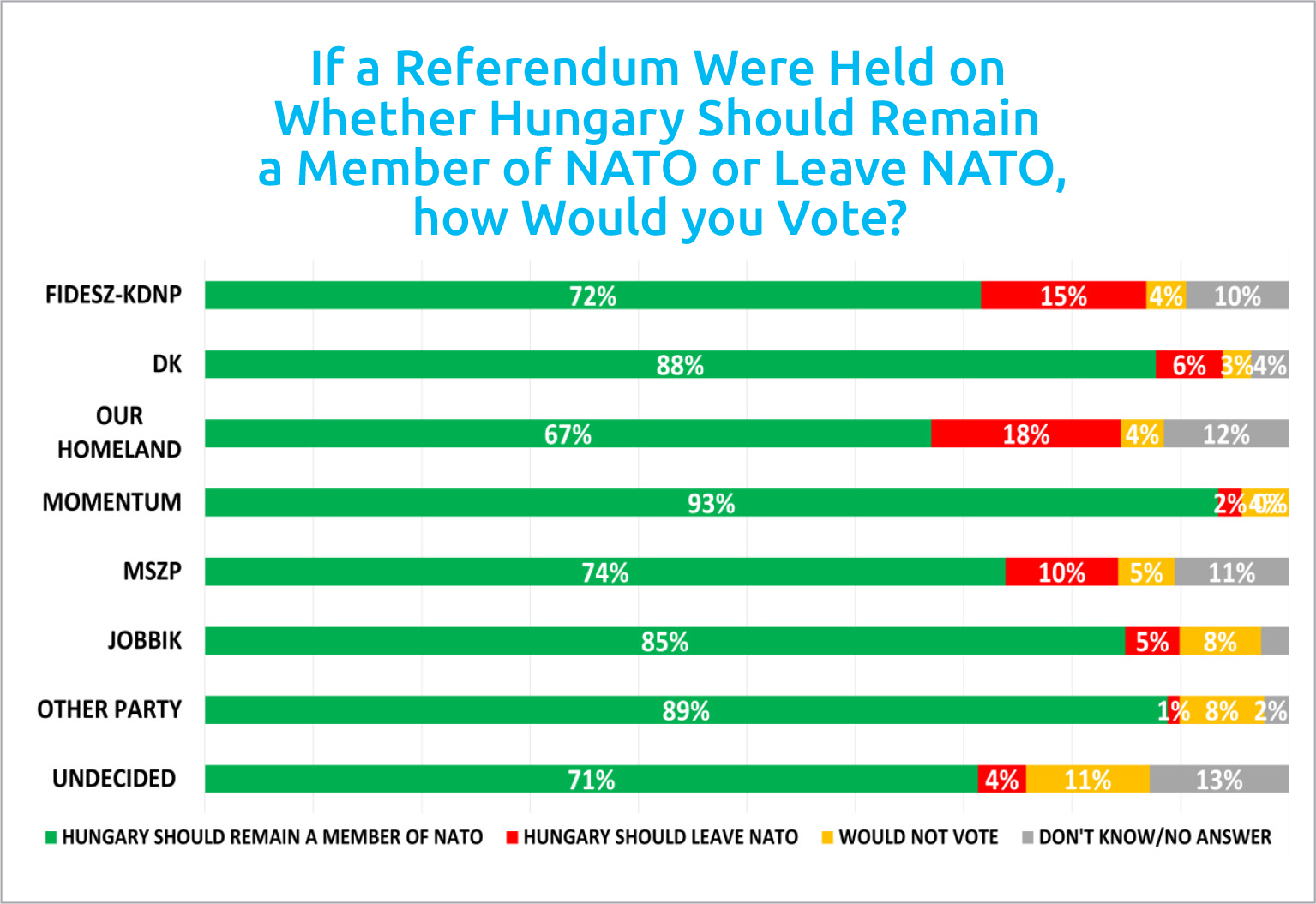Hungarian Public Support for U.S. Weakens, Doubles for Russia

Some two-thirds of Hungarians believe membership in both the European Union (64% support) and Nato (68%) to be beneficial for the country, according to a survey entitled “The World Through Hungarian Eyes: Foreign Policy Attitudes in Hungary in 2023,” released earlier this month.
Underpinning this result, the survey, commissioned by the left-leaning Policy Solutions think tank, revealed that if asked in a referendum whether the country should retain membership of the North Atlantic defense alliance, 76% would vote to remain, including 72% of Fidesz voters.
“I was positively surprised when I saw these numbers [….]; 76% is decent. [This and] our last four surveys are quite consistent in saying that support for EU membership is around 70%, despite all the Euroskeptic propaganda that you can hear every day from the Hungarian government media,” András Bíró-Nagy, director of Policy Solutions, told international journalists on June 14.
The survey, which delves into subjects ranging from Hungarians’ views on what the country’s foreign policy goals should be to the favorite international figures, reveals other facets of pro-Western public feelings. For example, 68% of respondents believe Sweden and Finland belong in Nato, a sentiment that has overwhelming support among voters for the leftist parties Momentum (87%) and Democratic Coalition (86%).
However, the survey has ominous findings for those who believe the country’s future is best served by cooperating closely with its Western allies and partners.
Notably, while 55% of respondents said that in terms of values, their country belongs to the West, 26% said Hungary should build closer relations with Russia, twice the proportion recorded to precisely the same question two years ago.
“Although from a low base, the number has doubled, which clearly shows the effect of the Russia-friendly communication of the Hungarian government in recent years, especially since the start of the war in Ukraine,” Bíró-Nagy said.
Lead Follower
Intriguingly, while on domestic issues, the Hungarian government tends to follow rather than form public opinion, when it comes to foreign policy, the survey indicates the reverse is true, especially among government party supporters.
For example, when given a list of 17 countries and asked which Hungary should have closer ties with, 67% of Fidesz voters favored Russia, compared to 34% of supporters of the former six-party opposition bloc.
As for the United States, Fidesz-voters put their Nato ally in second-bottom place on the list, although 64% still supported closer ties. However, this compares to 82% of opposition voters opting for stronger U.S. links.
A fifth of respondents (21%) deem that America frequently launches wars and asserts its interests aggressively.
“After so many years of this Eastern Opening strategy, and being critical of the West, of Nato, of the United States, even the German government, even having clashes with the Norwegian government, which I would say is quite a big achievement […] such politics now can be seen in the foreign policy attitudes of Fidesz voters,” Bíró-Nagy said.
“The polarization which has characterized Hungarian politics on many other issues can now be seen in foreign policy as well. I think this is very sad news,” he added.
But perhaps the best illustration of how government media policies affect the thinking of Hungarians from all political persuasions is the public perception of the war in Ukraine.
When respondents were asked about the economic effect of the European Union’s sanctions against Russia, a mere 11% believed that these had damaged Russia more than the European Union. Thirty-seven percent believe sanctions had been equally damaging to both sides, while 44%, agreeing with the government’s narrative, say that they have backfired and damaged the EU more than Russia.
“Of course, among Fidesz voters, this [last] number is way higher [at 56%] than for opposition voters [38%],” Bíró-Nagy said.
War Front
Respondents were also asked about the future of the war. Would Ukraine retake territory, would the front lines stay more or less unchanged, or would Russia expand its hold on Ukraine?
Opinions were mostly split between two options, with 39% expecting Russia to take more territory in Ukraine and equally 39% saying the lines would remain essentially unchanged. Just 7% believe Ukraine would retake lands occupied by Russia.
“The mood in Hungary doesn’t reflect the international consensus at all. Nobody in the international sphere believes that Russia will gain more territory, […] but the Hungarian people don’t see it like that. I think this is again clearly the effect of what they hear in the news, what they hear from the prime minister and what they see in government-related news channels,” Bíró-Nagy said.
But this reasoning invites another question: if the government narrative continues against the European Union and Nato, will public support in Hungary wane for these institutions, just as it appears to have done regarding the standing of the United States? For Bíró-Nagy, this is indeed a severe risk.
“I think we are in a really dangerous phase now, especially when it comes to the EU membership question,” he said, arguing that, from previous surveys focusing on the Union, the number one reason given by Hungarians for favoring EU membership is, “by a huge margin,” the money coming from Brussels. The second reason is the freedom to travel, work and study across Europe.
But with Hungary suspended from the Erasmus student program and significant funding from Brussels held in abeyance over rule of law issues and alleged backsliding on democracy, Hungarians can no longer fully enjoy these two top advantages of EU membership.
“My big fear is that Viktor Orbán and his government, [...] by reframing the narrative about why Hungary is not receiving EU funds and why Hungarian students cannot participate in the Erasmus programs if they can portray this as a punishment from the EU because we are standing up for conservative values, then, I believe the long-term support for Hungary’s EU membership is in danger,” he reasoned.
While cautioning that he did not imagine Hungary coming even “close to a Brexit scenario,” there is “a threat that support for the EU will not be as stable in the future as it has been over the last few years,” he said.
A 10-page English survey summary can be found on the policysolutions.hu website.
Russian President Tops and Tails Int’l Persons’ Poll
With 95% of respondents recognizing his name and role, Vladimir Putin leads the list of 23 names of international politicians and public figures presented to Hungarian respondents in the Policy Solutions survey.
Pope Francis (91%) and former U.S. President Donald Trump (90%) followed the Russian President.
Britain’s Rishi Sunak and India’s Narendra Modi tied for the wooden spoon of this selection, recognized by just one in three of those quizzed.
Pope Francis was top of the pops for admiration, with a 60% favorable rating. In fourth place overall, Emmanuel Macron leads what might be termed the “genuine” politicians’ sub-table, albeit with only 34% support.
Joe Biden was left struggling, coming in after China’s President Xi Jinping and garnering just 16% of supporters’ favor, ranking fourth from the bottom.
But the current U.S. President can at least take some consolation since he bested Vladimir Putin, who took bottom spot with just 9% support.
This article was first published in the Budapest Business Journal print issue of June 30, 2023.
SUPPORT THE BUDAPEST BUSINESS JOURNAL
Producing journalism that is worthy of the name is a costly business. For 27 years, the publishers, editors and reporters of the Budapest Business Journal have striven to bring you business news that works, information that you can trust, that is factual, accurate and presented without fear or favor.
Newspaper organizations across the globe have struggled to find a business model that allows them to continue to excel, without compromising their ability to perform. Most recently, some have experimented with the idea of involving their most important stakeholders, their readers.
We would like to offer that same opportunity to our readers. We would like to invite you to help us deliver the quality business journalism you require. Hit our Support the BBJ button and you can choose the how much and how often you send us your contributions.










